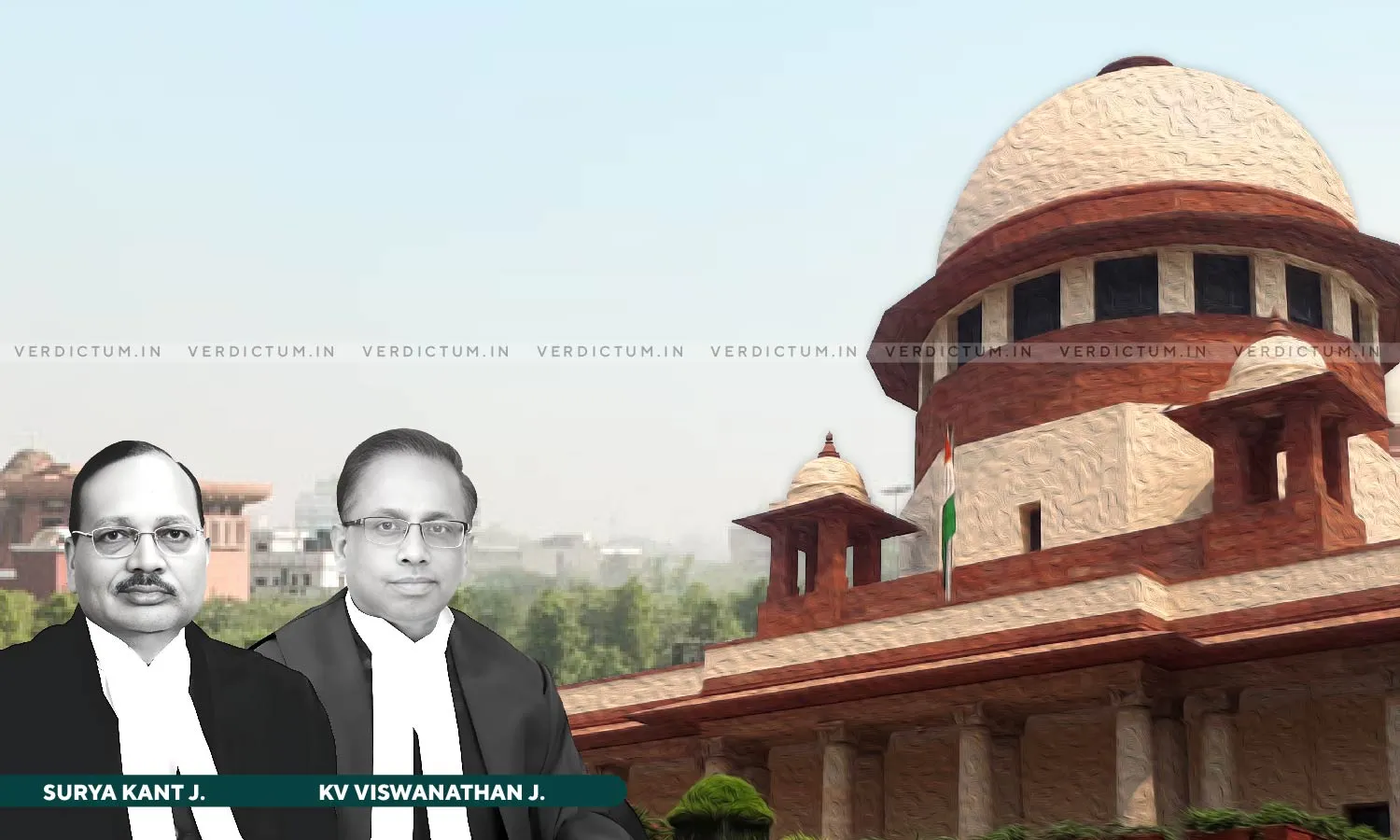Deceased Person's Statement To Police Officer U/S 161 CrPC Regarding Cause Of Death Can Be Considered As Dying Declaration: SC
The Supreme Court has emphasized that the statements made by a deceased person to a Police Officer under Section 161 CrPC, regarding the cause of death or circumstances leading to it, are admissible as dying declarations despite statutory restrictions, warranting cautious reliance by the court.
In that context, the Bench of Justice Surya Kant and Justice KV Viswanathan observed that, "a statement made by a person who is dead, as to the cause of his death or to the circumstances of the transaction which resulted in his death, to a Police Officer and which has been recorded under Section 161 CrPC, shall be relevant and admissible, notwithstanding the express bar against use of such statement in evidence contained therein. In such eventuality, the statement recorded under Section 161 CrPC assumes the character of a dying declaration. Since extraordinary credence has been given to such dying declaration, the court ought to be extremely careful and cautious in placing reliance thereupon."
The FIR was registered based on the statement of an Usha Bai (P.W.10). She reported that around 9:30 pm on the night of 20.06.2004, she oversaw the construction of her Jhuggi’s wall by Devi Singh @ Tillu and Tularam. Ahmad and his wife, Kanija Bi, objected to the construction. Soon, other accused, including Vijay, Dharmendra @ Dhamma (Appellant), Katchu @ Ramswaroop, Ballu, Ravi, and Asgar, joined and verbally abused the complainant, Tillu, and Tularam.
The accused physically assaulted Tillu, who took refuge in a nearby Jhuggi. The accused broke in, with the Appellant stabbing Tillu in the abdomen, and Asgar also stabbing him. Other accused assaulted Tillu with fists and sticks. Tularam, who tried to intervene, was also beaten by Katchu and Ahmad, causing head and hand injuries.
Tillu and Tularam were taken to Katju Hospital. Dr. R.S. Vijayvargiya (P.W.4) noted critical injuries on both. Tillu succumbed to his injuries, while Tularam was admitted to Hamidia Hospital and later died from a head injury.
Dr. C.S. Jain (P.W.13) performed Tillu's post-mortem and confirmed death due to multiple stab wounds and head injuries. Investigating Officer Girish Bohre (P.W.14) documented the scene and seized blood-stained evidence. Tularam's statement under Section 161 CrPC implicated the accused. The Appellant disclosed the location of the knife, which was found with human blood, but the blood group classification was inconclusive.
The appellant argued that there were inherent contradictions in the prosecution's case. They emphasized that the forensic examination of the knife, which had human blood on it, produced inconclusive results, supporting the Appellant's claim of false implication. Finally, they argued that the statement of the deceased Tularam recorded under Section 161 of the CrPC by the Investigating Officer (P.W.14) should not be considered a reliable dying declaration due to the lack of medical certification of Tularam's mental fitness and the general suspicion surrounding dying declarations made to the police.
The Apex Court examined the arguments and evidence presented by both parties and ultimately upheld the findings of the Trial Court and the High Court. It was noted that human blood was detected on the knife recovered from the Appellant, which was significant since no human blood was found on other weapons examined. In that context, it was further said that, "nonexplanation of human blood on the weapon of crime constitutes a circumstance against the accused. It is incumbent upon the accused to provide an explanation regarding the presence of human blood on the weapon. The Appellant has failed to do so. The judgments delivered by both the Trial Court and the High Court also do not reveal that the Appellant rendered any satisfactory explanation concerning the presence of blood on the recovered knife. While it may not be a decisive factor to determine the guilt, but a conspicuous silence does lend support to the prosecution case."
The Court also addressed the Appellant's contention regarding the statement of Tularam, recorded under Section 161 of the CrPC, arguing it could not be considered a dying declaration due to the lack of medical certification of Tularam's mental fitness. The Court reiterated that Section 32(1) of the Indian Evidence Act (IEA) allows statements made by a deceased person about the cause of death to be admissible as dying declarations, regardless of whether the person was under the expectation of death. Moreover, Section 162(2) of the CrPC allows statements recorded under Section 161 to be admissible if they fall within the scope of Section 32(1) of the IEA. The Court emphasized that a dying declaration can be oral or written and does not necessarily require medical certification if other evidence suggests the declarant was in a fit state of mind. In this case, the Investigating Officer's prompt recording of Tularam's statement, along with corroboration from eyewitnesses and medical reports, indicated that Tularam was capable of making the declaration.
The Court concluded that there were no significant contradictions or discrepancies in the prosecution's case to warrant a different verdict.
Cause Title: Dharmendra Kumar @ Dhamma vs State of Madhya Pradesh
Click here to read/download the Judgment




